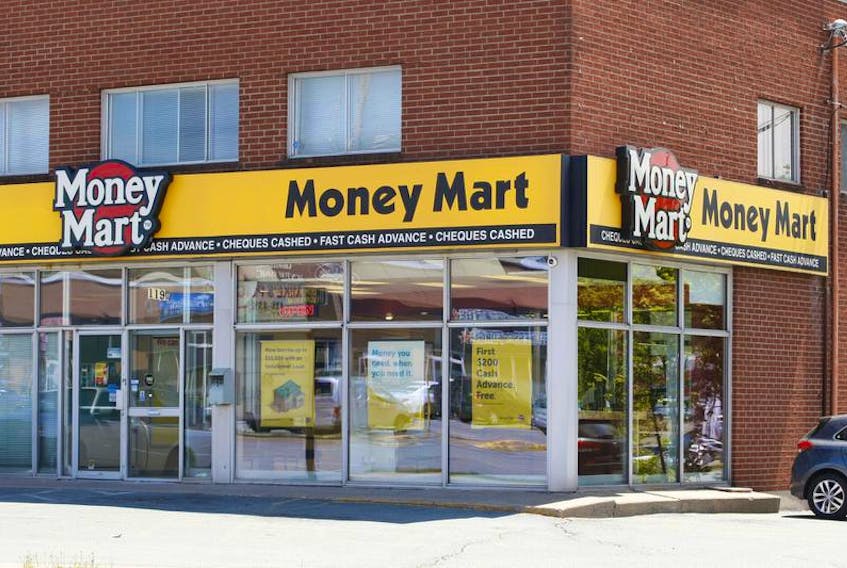The New Democrats introduced a bill Tuesday that would offer consumers an alternative to expensive payday loans.
“Because of the exorbitant interest rates and the way that the interest compounds with payday lenders, many people who use the money get into a cycle of owing,” said Susan Leblanc, the NDP representative for Dartmouth North. “It can really quickly spiral out of control. Our bill is essentially offering an alternative to those types of loans, which are much lower interest micro-credit loans which would be offered through the credit union system.”
There are 42 payday loan outlets in Nova Scotia, according to a report commissioned for consumer advocate Dave Roberts and submitted to the Nova Scotia Utility and Review Board. The board does reviews of the payday loan industry every three years to discuss restrictions on concurrent and repeat loans.
The board hearing was held this month and a decision is pending.
Roberts, a Halifax lawyer, has pushed for a reduction in the maximum cost of borrowing, which is now set at $22 per $100 loaned. He would like to see the maximum cost dropped to $15 per $100.
“Payday loan companies exploit poor people by charging effective interest rates that can be as high as 600 per cent,” Leblanc said. “Many Nova Scotians are forced to use payday loans due to a lack of other financial alternatives, and then they get stuck in a vicious repayment cycle. This legislation would help thousands of people take back control of their finances from destructive payday loan companies.”
The report commissioned by Roberts and completed by Michael Gardner of Gardner Pinfold Consultants in Halifax shows that more than 1,400 payday loan outlets in Canada provide between $2.3 billion to $2.7 billion of loans to borrowers per year.
The industry offers low-value, short-term credit through both physical storefronts and online sites and Patrick Mohan, president of the Independent Payday Loan Association of Canada, said in a submission to the utility and review board that his organization is not the usury villain it is often made out to be.
“Instalment loans get the consumer into long-term debt, perhaps never to be repaid, which is precisely the point for the lender,” Mohan said of instalment loans banks offer to consolidate consumer debts. “Just as in the case of Visa and MasterCard, the banks never want you to repay the full balance on a monthly basis. They have even deeper pockets than the Money Marts and Cash Moneys. They want their money fully deployed all the time to maximize revenue.”
Mohan said payday loan outlets are not the root cause of “poverty, household debt, bankruptcy, or any other financial hardship”
“Although we do offer unsecured loans at high cost, it is a short-term loan which does not burden the consumer on an ongoing basis like Visa cards. Our loans are normally for two weeks, and not a lifetime. ... Perhaps, something should be done about the high cost of those credit cards before you even consider closing us down or restricting people’s access to our service by limiting our storefronts and our ability to deliver our product profitably.”
Leblanc said the NDP is suggesting the credit union route because the province regulates both credit unions and payday lenders, while banks are federally regulated. She said the party has talked with credit union representatives who have indicated they would like to offer the service but only if the provincial government were to provide loan guarantees like those offered on small business loans.
“If there was a will by the government, credit unions could certainly step up,” she said.
Leblanc said the legislation would cover short-term loans for small amounts.
“The average loan from a payday lender is around $500,” she said.
“It’s a win-win situation. What it essentially would do is provide an alternative for people that’s not going to necessarily end payday lenders but it will offer them some competition, which is good for everybody. Our hope is that people would either go to the credit unions or the payday lenders would be forced to lower their interest rates and to look at the way they are functioning.”
Leblanc is hopeful that the government will call the bill for debate before the legislative session ends.
“We look at all legislation before the House,” Geoff MacLellan, the government House leader, said through email. “It is too early to comment on this bill as we would need to analyze its impact and talk with stakeholders before making a decision.”









